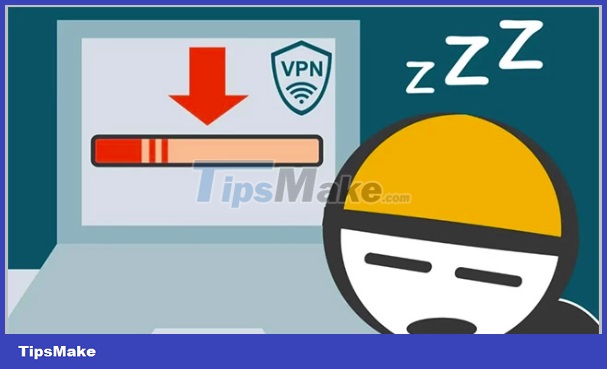Does a VPN slow down your Internet connection?
Large corporations, educational institutions, and government agencies use VPN technology to allow remote users to securely connect to their own private network.
In simple terms, we use VPNs to protect our privacy in the internet world, avoiding the eyes of hackers, network service providers (ISPs) and data thieves. However, have you ever wondered if a VPN slows down your Internet connection?
VPN can slow down Internet connection
First, it must be confirmed that a VPN will more or less slow down your internet connection, despite the fact that some unreliable providers always claim the opposite. However, the question is why is the VPN slowing down the internet connection, and if there is a way to fix the problem.
Some VPN providers advertise that their service can increase internet speed, but the reality is quite the opposite. VPN will always cause a drop in speed for the internet connection, it's just a matter of more or less. When a VPN is said to be fast, this implies that it causes less internet speed degradation than its competitors. There are three main reasons why a VPN slows down your connection, arranged in descending order as follows.
Distance to VPN server
The biggest problem affecting internet speed when using a VPN is the distance between you and the VPN server. The greater the distance, the greater the loss. For example, if you are in Hanoi, a server in Da Nang will cause less speed degradation than a server in Ho Chi Minh City. That's not to mention the case you connect to servers located abroad.
This is because the transmission of data is still fundamentally subject to the laws of physics. When surfing the internet, you are sending and receiving so-called data packets and they need to travel to and from yourself to the target server. The longer the data route must travel, the greater the delay between reception and response will be.
Server is overloaded
Another important factor that makes a VPN slow is the load on the server you're connecting to. A server can only handle a certain amount of traffic. The closer you get to that limit, the greater the speed loss will be.
Therefore, if you connect to a server that is even just a few kilometers away but is running low on capacity, you may experience worse connection speeds than if you were connecting to a server located abroad but currently running. 'free'. Of the three factors, this is the one most affected by the VPN providers themselves. A good service provider will invest in improving the quality of its infrastructure so that users do not experience slow server overload.
Encryption and protocol
The final factor that affects VPN speed is the protocol and encryption used. While not as important as the distance and load condition of the server, it still plays a big role in connection speed. This is because when using a VPN, you are sending your information through a so-called 'VPN tunnel'. Before sending, the data packets will be encrypted and then decrypted when they arrive at their destination. This process takes time, it's basically pretty fast, but combined with other factors, the total wasted time can add up.
More complex encryption takes longer, as does decryption. The protocol used has the same effect. This is partly because the VPN protocol determines the level of encryption — but also because some protocols are simply faster than others. For example, IKEv2 is faster than OpenVPN, but comes with some security issues.

How to speed up VPN connection
From the above aspects, we can also find ways to speed up the VPN connection. Not all of the tips below are right for everyone, but even modestly applying them should see some noticeable improvements.
Choose a nearby server
The easiest way is to use a server as close to you as possible, in the country the better. You will see a significant improvement in connection speed.
Change protocol
The second tip that also has a very pronounced impact is to change the protocol. For example, if your connection is very slow, changing from TCP to UDP can speed it up significantly, or even using IKEv2 instead of OpenVPN is a good idea if security is not a major concern. your head. However, since you know exactly what you're doing, messing with the protocol settings can put you at security risk.
Choose a Reputable VPN Provider
Finally, most likely the quality of the provider's server that you are using is not really good. In this case, you should consult reviews of the best VPNs. Popular, reputable VPN service providers will often also have high-quality servers. Of course, the cost of puddle translation may also be higher, but the benefits you get are well worth the trade-off.